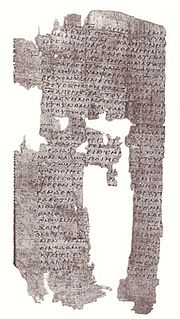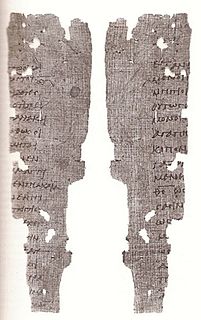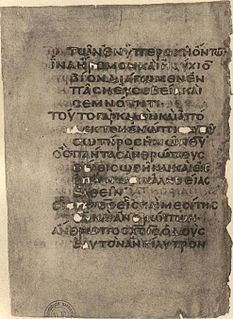
Ephesians 6 is the sixth chapter of the Epistle to the Ephesians in the New Testament of the Christian Bible. Traditionally, it is believed to be written by Apostle Paul while he was in prison in Rome, but more recently, it is suggested to be written between AD 80 and 100 by another writer using Paul's name and style. This chapter is a part of Paul's exhortation, with the particular section about how Christians should live in their responsibilities as households (5:21–6:9) and in the battle against spiritual forces (6:10–20), with a final benediction to close the epistle (6:21–24).
Acts 20 is the twentieth chapter of the Acts of the Apostles in the Christian New Testament of the Bible. It records the third missionary journey of Paul the Apostle. The book containing this chapter is anonymous, but early Christian tradition uniformly affirmed that Luke the Evangelist composed this book as well as the Gospel of Luke.

Romans 12 is the twelfth chapter of the Epistle to the Romans in the New Testament of the Christian Bible. It is authored by Paul the Apostle, while he was in Corinth in the mid 50s AD, with the help of an amanuensis (secretary), Tertius, who adds his own greeting in Romans 16:22.

1 Corinthians 6 is the sixth chapter of the First Epistle to the Corinthians in the New Testament of the Christian Bible. It is authored by Paul the Apostle and Sosthenes in Ephesus. In this chapter, Paul deals with lawsuits among believers and with sexual immorality.

2 Corinthians 1 is the first chapter of the Second Epistle to the Corinthians in the New Testament of the Christian Bible. It is authored by Paul the Apostle and Timothy in Macedonia in 55–56 CE.

2 Corinthians 13 is the thirteenth and final chapter of the Second Epistle to the Corinthians in the New Testament of the Christian Bible. It is authored by Paul the Apostle and Timothy in Macedonia in 55–56 CE.

Ephesians 1 is the first chapter of the Epistle to the Ephesians in the New Testament of the Christian Bible. Traditionally, it is believed to have been written by Apostle Paul while he was in prison in Rome, but more recently, it has been suggested that it was written between AD 80 and 100 by another writer using Paul's name and style. This chapter contains the greeting, followed by a section about "The Blessing of God" and Paul's prayer.

Ephesians 2 is the second chapter of the Epistle to the Ephesians in the New Testament of the Christian Bible. Traditionally, it is believed to have been written by Apostle Paul while he was in prison in Rome, but more recently it has been suggested that it was written between AD 80 and 100 by another writer using Paul's name and style.

Ephesians 4 is the fourth chapter of the Epistle to the Ephesians in the New Testament of the Christian Bible. Traditionally, it is believed to have been written by Apostle Paul while he was in prison in Rome, but more recently, it has been suggested that it was written between AD 80 and 100 by another writer using Paul's name and style. This chapter is a part of Paul's exhortation, with the particular section about the mutual interdependence of the Christians as the church and how they should live in the world (4:17–5:20).

Ephesians 5 is the fifth chapter of the Epistle to the Ephesians in the New Testament of the Christian Bible. Traditionally, it is believed to be written by Apostle Paul while he was in prison in Rome. More recently, it is suggested to be written between AD 80 and 100 by another writer using Paul's name and style, however this theory is not widely accepted. This chapter is a part of Paul's exhortation, with the particular section about how Christians should live in the world (4:17–5:20) and in their responsibilities as households (5:21–6:9).

Colossians 1 is the first chapter of the Epistle to the Colossians in the New Testament of the Christian Bible. Traditionally, it is believed to have been written for the churches in Colossae and Laodicea by Apostle Paul, with Timothy as his co-author, while he was in prison in Ephesus, although there are debatable claims that it is the work of a secondary imitator, or that it was written in Rome. This chapter contains the greeting, thanksgiving and prayer, followed by a "Christological Hymn" and the overall thesis of the letter.

Colossians 2 is the second chapter of the Epistle to the Colossians in the New Testament of the Christian Bible. Traditionally, it is believed to have been written for the churches in Colossae and Laodicea by Apostle Paul, with Timothy as his co-author, while he was in prison in Ephesus, although there are debatable claims that it is the work of a secondary imitator, or that it was written in Rome. This chapter continues the exposition about the 'Servant of the Mystery' and the warning against errors.

Colossians 3 is the third chapter of the Epistle to the Colossians in the New Testament of the Christian Bible. Traditionally, it is believed to have been written for the churches in Colossae and Laodicea by Apostle Paul, with Timothy as his co-author, while he was in prison in Ephesus, although there are debatable claims that it is the work of a secondary imitator, or that it was written in Rome. In the previous chapter, Paul has reminded the people that they no longer "belong to the world", but they are to live in intimate union with Christ, and this chapter contains his advice how he wants the Colossians to live.

Colossians 4 is the fourth chapter of the Epistle to the Colossians in the New Testament of the Christian Bible. Traditionally, it is believed to have been written for the churches in Colossae and Laodicea by Apostle Paul, with Timothy as his co-author, while he was in prison in Ephesus, although there are debatable claims that it is the work of a secondary imitator, or that it was written in Rome. This chapter contains the final exhortations and greetings.

1 Thessalonians 1 is the first chapter of the First Epistle to the Thessalonians in the New Testament of the Christian Bible. It is authored by Paul the Apostle, likely written in Corinth in about 50-51 AD for the church in Thessalonica. This chapter contains the prescript and Paul's thanksgiving for the church.

1 Thessalonians 5 is the fifth chapter of the First Epistle to the Thessalonians in the New Testament of the Christian Bible. It is authored by Paul the Apostle, likely written in Corinth in about 50-51 CE for the church in Thessalonica. This chapter contains a message about Christ's second coming, and various final exhortations and greetings.

2 Thessalonians 1 is the first chapter of the Second Epistle to the Thessalonians in the New Testament of the Christian Bible. Traditionally, it is believed to have been written for the church in Thessalonica by Apostle Paul, likely in Corinth shortly after the first epistle, although there were debatable claims that it is the work of a secondary imitator after Paul's death. This chapter contains the prescript, thanksgiving and a message of encouragement for the recipients.

Philippians 1 is the first chapter of the Epistle to the Philippians in the New Testament of the Christian Bible. It is authored by Paul the Apostle about mid-50s to early 60s AD and addressed to the Christians in Philippi, written either in Rome or Ephesus. This chapter contains the greeting, thanksgiving, prayer and exhortation as an introduction (overture) to the major narratives in the next chapters.

2 Timothy 1 is the first chapter of the Second Epistle to Timothy in the New Testament of the Christian Bible. The letter is traditionally attributed to Paul the Apostle, the last one written in Rome before his death, addressed to Timothy. There are charges that it is the work of an anonymous follower, after Paul's death in the first century AD. This chapter contains an opening greeting, a personal story of Paul and Timothy, a description of the opponents they are facing.

1 Peter 1 is the first chapter of the First Epistle of Peter in the New Testament of the Christian Bible. The author identifies himself as "Peter, an apostle of Jesus Christ", and the epistle is traditionally attributed to Peter the Apostle, but some writers argue that it is the work of Peter's followers in Rome between the years 70 and 100. After an introductory section, this chapter contains several "general exhortations founded on the blessedness of the Christian state", which continue into chapter 2.













